AR ABLE
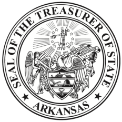 ABLE Accounts are tax-advantaged savings accounts for individuals with disabilities and their families.
ABLE Accounts are tax-advantaged savings accounts for individuals with disabilities and their families.
Get all the details and apply online here
Learn more from our webinar replay from 1/14/21
Listed A-Z
 ABLE Accounts are tax-advantaged savings accounts for individuals with disabilities and their families.
ABLE Accounts are tax-advantaged savings accounts for individuals with disabilities and their families.
Get all the details and apply online here
Learn more from our webinar replay from 1/14/21
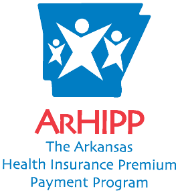
The Arkansas HIPP program is designed to save money for families with high healthcare costs by reimbursing members for the cost of group health insurance provided by an employer or through COBRA. In some cases, members can receive reimbursement for the premium cost of a family health insurance policy. The program also eliminates some out-of-pocket medical expenses for qualifying Medicaid clients.
http://myarhipp.com/general-program-information/
2024 Tax Forms are here
Fill these forms out each tax season if you have a dependent with Down Syndrome. Note: one of these forms requires a doctor to fill out.
The Arkansas Developmental Disability Network is made up of 3 “sister” agencies provided through the federal Developmental Disabilities Act. These 3 agencies are:

Governor-appointed, the Arkansas Governor’s Developmental Disability Council consist of individuals with developmental disabilities, family members, directors of state agencies that serve people with disabilities and representatives from nonprofit and private organizations that provide services and supports for people with disabilities. The Council’s main objective is to improve the independence and productivity of people with developmental disabilities and to ensure their integration and inclusion into the community.
Visit Online
Arkansas Governor’s Council on Developmental Disabilities
 DRA is the federally authorized and funded nonprofit organization serving as the Protection and Advocacy System (P&A) and the Client Assistance Program (CAP) for individuals with disabilities in Arkansas. DRA is authorized to advocate for and protect human, civil and legal rights of all Arkansans with disabilities consistent with federal law. DRA services are provided free of charge.
DRA is the federally authorized and funded nonprofit organization serving as the Protection and Advocacy System (P&A) and the Client Assistance Program (CAP) for individuals with disabilities in Arkansas. DRA is authorized to advocate for and protect human, civil and legal rights of all Arkansans with disabilities consistent with federal law. DRA services are provided free of charge.
Visit Online
https://disabilityrightsar.org/
![]() Partners for Inclusive Communities (Partners) is Arkansas’ University Center on Disabilities. Administratively located within the University of Arkansas College of Education and Health Professions, Partners is a member of the nationwide Association of University Centers on Disabilities. Partners achieves its mission by assessing the needs of individuals with disabilities, then addressing those needs through research, education, community service, training, technical assistance and collecting and sharing information.
Partners for Inclusive Communities (Partners) is Arkansas’ University Center on Disabilities. Administratively located within the University of Arkansas College of Education and Health Professions, Partners is a member of the nationwide Association of University Centers on Disabilities. Partners achieves its mission by assessing the needs of individuals with disabilities, then addressing those needs through research, education, community service, training, technical assistance and collecting and sharing information.
Visit Online
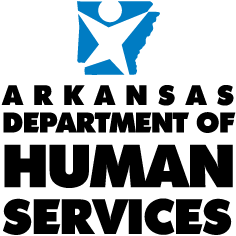 Medicaid reimburses health care providers for covered medical services provided to eligible needy individuals in certain categories. Eligibility is determined based on income, resources, Arkansas residency, and other requirements. Covered services also vary among categories. Categories are summarized under the two headings of “Aged, Blind and Disabled” and “Children and Family”.
Medicaid reimburses health care providers for covered medical services provided to eligible needy individuals in certain categories. Eligibility is determined based on income, resources, Arkansas residency, and other requirements. Covered services also vary among categories. Categories are summarized under the two headings of “Aged, Blind and Disabled” and “Children and Family”.
Visit Online
https://humanservices.arkansas.gov/
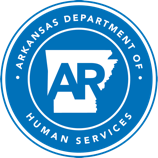 “The Community and Employment Support (CES) Waiver offers services in your community to support clients with intellectual or developmental disabilities (IDD) with all major life activities, such as living independently and working at a job with help from an employment coach.”
“The Community and Employment Support (CES) Waiver offers services in your community to support clients with intellectual or developmental disabilities (IDD) with all major life activities, such as living independently and working at a job with help from an employment coach.”
You can find out your waitlist number by email at DHS.DDS.Waiver.AU@dhs.
https://ardhs.my.site.com/DDSReferral/s/referral-intake
Download this form and take it to your DMV to receive a communication impediment decal.
https://www.dfa.arkansas.gov/wp-content/uploads/communicationImpedimentDecalFrm.pdf
 The Arkansas Department of Human Services (DHS) has launched an educational campaign to raise public awareness about the availability of home and community-based services (HCBS) for Medicaid beneficiaries in Arkansas.
The Arkansas Department of Human Services (DHS) has launched an educational campaign to raise public awareness about the availability of home and community-based services (HCBS) for Medicaid beneficiaries in Arkansas.
A new website offers information about the specific HCBS programs and services available, who they are designed to benefit, what they provide, and how to apply for them. This one-stop shop includes fact sheets, flyers, and other materials to read and share to help spread the word about these valuable services.
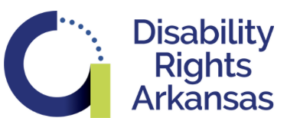 “Our Mission is to vigorously advocate for and enforce the legal rights of people with disabilities.
“Our Mission is to vigorously advocate for and enforce the legal rights of people with disabilities.
We Envision an Arkansas where people with disabilities are equal members in their communities and can dictate the course of their own lives through self-determination.”
https://disabilityrightsar.org/
Use this pdf document to apply for a disabled tag at an Arkansas DMV.
https://ardownsyndrome.org/wp-content/uploads/2020/07/DrsCertificateforDisabled-1.pdf
 Early intervention (0-3) under Part C of the Individuals with Disabilities Education Act (IDEA) is First Connections. The Department of Human Services, Division of Developmental Disabilities Services is the “lead agency” with administrative oversight. First Connections provides supports and services for families and their children, birth to age three who have special needs. Research shows that this is a critical time of development in the lives of all children. Families of infants and toddlers with special needs can turn to First Connections for information, support, and services to help them assist their child in reaching his/her potential. First Connections is a state-wide, comprehensive early intervention network of qualified, dedicated professionals here to work directly with your family to custom-design a plan with you to meet your child’s and your family’s needs.
Early intervention (0-3) under Part C of the Individuals with Disabilities Education Act (IDEA) is First Connections. The Department of Human Services, Division of Developmental Disabilities Services is the “lead agency” with administrative oversight. First Connections provides supports and services for families and their children, birth to age three who have special needs. Research shows that this is a critical time of development in the lives of all children. Families of infants and toddlers with special needs can turn to First Connections for information, support, and services to help them assist their child in reaching his/her potential. First Connections is a state-wide, comprehensive early intervention network of qualified, dedicated professionals here to work directly with your family to custom-design a plan with you to meet your child’s and your family’s needs.
https://dhs.arkansas.gov/dds/firstconnectionsweb/#fc-home
iCAN is the Arkansas statewide Assistive Technology program designed to make technology available and accessible for everyone who needs it. Assistive technology (AT) is any kind of device or tool that helps people live, learn, work, and communicate more independently. AT can be very simple and inexpensive, like a modified knife and fork, or it can be very sophisticated and costly, like a computerized speech device.
iCAN stands for Increasing Capabilities Access Network and Tools for Life is our philosophy—assistive technology for everyone! iCAN offers a number of services to help Arkansans of all ages find the AT tools they need for home, school, work and getting around in the community.

The Provider-led Arkansas Shared Savings Entity (PASSE) is a new model of organized care that will address the needs of certain Medicaid beneficiaries who have complex behavioral health and intellectual and developmental disabilities service needs.
The goal of the PASSE system is to monitor client’s health care needs, keep them healthy, and help them reach goals. DHS,AFMC and each PASSE continues to work together internally to address questions or concerns for providers and clients about the PASSE program as they arise. March 01, 2020 is the one-year anniversary of the PASSE program that is serving nearly 40,000 Arkansas Medicaid clients.

“Arkansas Total Care is committed to providing whole health solutions for people with IDD and Behavioral Health needs. Our unique, person-centered approach ensures each individual receives comprehensive care coordination tailored specifically for them. With over 20 years of experience, the partners at Arkansas Total Care provide support services that collectively create healthier, happier individuals –ultimately improving their overall quality of life.”
 “CareSource is nationally recognized for leading the industry in providing member-centric health care coverage. The company’s managed care business model was founded in 1989 and today CareSource is one of the nation’s largest Medicaid managed care plan”
“CareSource is nationally recognized for leading the industry in providing member-centric health care coverage. The company’s managed care business model was founded in 1989 and today CareSource is one of the nation’s largest Medicaid managed care plan”
Visit online: https://www.caresource.com/ar/plans/caresource-passe/

“Empower Healthcare Solutions is here to help you with your health care. Empower works with you and your doctors. Our goal is to give you the best services and to improve your health. We also want you to be part of your care planning. Empower believes this will help you reach your life goals.”

“We’re a Provider-Led Arkansas Shared Savings Entity (PASSE). We work with the Arkansas Medicaid Program to help individuals with developmental disabilities or behavioral health needs keep track of their health and maintain their independence.”
https://www.summitcommunitycare.com/arkansas-passe/home.html
Project AWIN is Arkansas’ Work Incentives Planning and Assistance (WIPA) program. A WIPA Coordinator can meet with you individually to discuss how returning to work will impact your benefits. WIPA can help you understand the Social Security work incentives available under the Supplemental Security Income and Social Security Disability Insurance programs, so you can maximize your income and healthcare options to achieve greater financial self-sufficiency. Contact a WIPA Coordinator by calling 1-888-284-7521
https://dhs.arkansas.gov/dds/employment1stweb/#emp1-families
 “rEcess is a parents night out that churches offer to families experiencing disability in their community. 99 Balloons has done the hard work to allow churches the opportunity to begin building relationships sooner!”
“rEcess is a parents night out that churches offer to families experiencing disability in their community. 99 Balloons has done the hard work to allow churches the opportunity to begin building relationships sooner!”
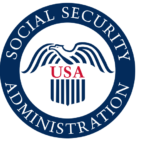 This is the official info page from the Social Security Administration, full of information on SSI benefits. There is pertinent information at both of the links below.
This is the official info page from the Social Security Administration, full of information on SSI benefits. There is pertinent information at both of the links below.
The Tax Equity and Fiscal Responsibility Act (TEFRA) is a Medicaid program that can help families with children younger than 19 years old who have a disability receive care in their homes rather than an institution. The TEFRA program can help pay for the cost of those services for eligible children. Some families will not have to pay anything as part of the program. Others pay a premium on a sliding scale, depending on their income. Children who live in an institution or receive extended care in an institution are not eligible for TEFRA.
You can apply for the program by filling out the TEFRA application packet and submitting it to your local DHS county office. If you need help or have questions, feel free to call: 1-855-372-1084.
Also known as the Katie Beckett option, TEFRA is a category of Medicaid that provides care to disabled children in their homes rather than in institutions. To qualify for TEFRA benefits, the child must be disabled according to the Supplemental Security Income (SSI) definition of disability and must meet the medical-necessity requirement for institutional care. Children who live in institutions or who receive extended care in institutions are not eligible in the TEFRA category. To qualify for TEFRA benefits, the child:
 Our Mission
Our Mission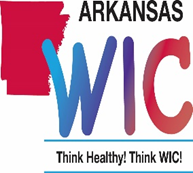 The WIC (Women, Infants and Children) special supplemental nutritional program provides supplemental food for children when they need food high in nutrition for critical growth. The program also provides supplemental nutritional aid for women so that the baby can grow into a strong and healthy adult. The program encourages breastfeeding and provides necessary support for it. In addition to these benefits, the Arkansas WIC program also helps mothers learn about important nutrients and dietary habits so that they can maintain healthy diet for infant and children.
The WIC (Women, Infants and Children) special supplemental nutritional program provides supplemental food for children when they need food high in nutrition for critical growth. The program also provides supplemental nutritional aid for women so that the baby can grow into a strong and healthy adult. The program encourages breastfeeding and provides necessary support for it. In addition to these benefits, the Arkansas WIC program also helps mothers learn about important nutrients and dietary habits so that they can maintain healthy diet for infant and children.
http://www.healthy.arkansas.gov/programs-services/topics/wic

Arkansas Down Syndrome Association promotes and enhances the overall health and well-being of people with Down syndrome and their families.
Learn more about ADSA >